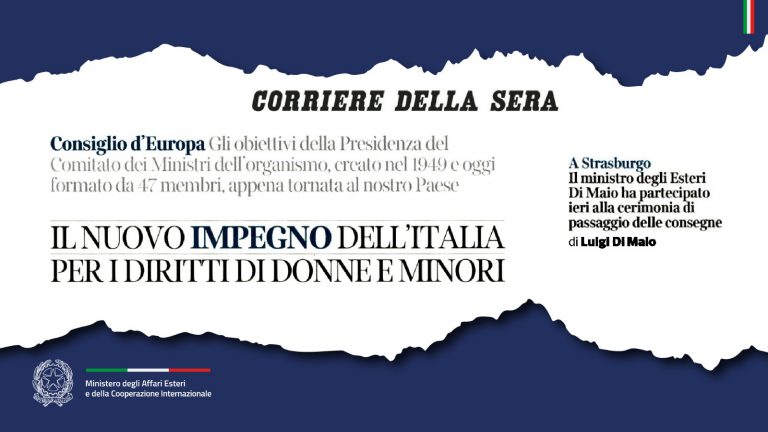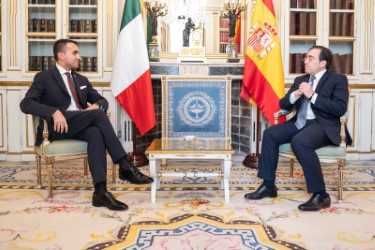«Europe has made mistakes but extreme nationalisms destroy the Union. »
«The EU has shown that it knows how to build peace, and we must not forget this. »
«Brussels has numerous shortcomings: it is an unfinished accomplishment. »
«Exacerbated NATIONALISM is antithetic to the European integration project. Excessive nationalisms can destroy what has been laboriously achieved in our continent from 1950 on. » Foreign Minister Enzo Moavero Milanesi is a staunch Europeanist and nurtures the value of historic memory. These are the grounds that form his bases for claiming the merits and denouncing the limits of the European Union.
Minister Moavero, you will be celebrating the 75th anniversary of the slaughter of Marzabotto. And, for the first time, our Foreign Minister will be together with the German minister. What is the significance of a joint celebration?
«It is the first time and this is important because, in this phase of the relations between Italy and Germany, it proves two things. On the one hand, that the two Countries have both overcome the horrors of World War II, have fully reacquired their democratic freedoms and undertaken the road towards European integration. On the other hand, that they have a lively friendship that can be vivaciously dialectic while being founded on a solid commonality of ideals. »
President Mattarella, in his message for the occasion, said that «the germ of hatred is never defeated forever». Rising xenophobia in several Countries seems to prove him right. Was it only a mere illusion?
«Possibly, even if the “iron curtain” showed us that there was a dangerous contradiction in Europe. When it fell, many of us thought that we had finally turned page forever but what happened in former Yugoslavia at the beginning of the ‘90s brought back to mind the fact that the massacres, of which Marzabotto is a symbol, are not buried in history books. The spectres of age-old hatreds exist and we must be very careful not to reawaken them. »
What has the European Union done and what can it still do to assure peace, prosperity and rights in the old continent?
«The Union has unarguably shown the capacity to build peace among European people. Today we take it for granted but, on a closer look, we see that it is an epochal achievement. For our grandparents and forefathers, it was normal to have a war every new generation. Now it is unthinkable. Another merit of European integration is the spread of an unprecedented wellbeing through all the member Countries. Nonetheless, the world is changing, it has new players. We Europeans should ask ourselves what our States can do alone compared to what they can do together. »
So therefore, is European integration unavoidable?
«I believe it is the best road possible. But we must take it by overcoming the menaces that fall on our way. We are facing an economic and work-related challenge, we must govern migration flows, we must tackle climate change and keep up pace with continuous innovation. Only if we are capable of proving that together we can better manage these very tangible emergencies, will our citizens confide in Europe. Instead, if we are incapable of giving answers, we risk that this project – theoretically unavoidable – will actually turn out to be incapable of meeting expectations. »
Are you worried about the rise of nationalisms, with a tinge of xenophobia, in many European countries?
«It is worrying because exacerbated nationalism is antithetic to the European integration project. I always say that States, by joining the EU, partly give up the exercise of their exclusive national sovereignty rights in order to share them with other States. This is the essence of the construction of Europe. The EU is not yet a federation but it is much more than a simple international organisation of States. The return of nationalisms reduces and may annul this sharing process. There is more than just one risk behind such a prospect: indeed, excessive nationalisms can destroy what has been laboriously achieved in our continent from 1950 on. »
In the meantime, the popularity of the EU is at an all-time low, and not only in Italy
«The European Union has numerous shortcomings: it is an unfinished accomplishment, with institutions that look federal, but are actually not. Expectations are often higher than the results, which are often disappointing and tardy. Suffice it to think of the swinging responses to the great global economic crisis or the shortcomings in the face of epochal migration flows. »
So, how can we relaunch the EU?
«In order to relaunch the EU, we must first recover the spirit of sharing. A better Europe is possible and necessary. But, to achieve this, we need authentically great leadership among policy makers and leaders. »



